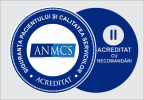Colonoscopy
What is a colonoscopy?
Colonoscopy is a method of investigation of the lower digestive tract, rectum, sigmoid, transverse, descending and ascending colon, the cecum until the ileo-cecal valve and even the last ileale, direct viewing by using a flexible tube (colonoscope) equipped with a video camera. The result is communicated to the patient immediately after completion of the procedure.
The exploration may take up to 40 minutes and is painless, according to each individual's tolerance may present a degree of discomfort. Before the procedure is administered a sedative to easily prevent this discomfort. This method makes the diagnosis (benign or malignant lesions) of tissue (biopsies).
The procedure must be indicated by a doctor, so it is preferable a consultation from your gastroenterologist or internist before the investigation.
Transit disorders: diarrhea, constipation, diarrhea/constipation alternating
Screening for bowel cancer
Detection of polyps what poses a preparatory stage colo-rectal cancer
Detection of inflammatory bowel disease (Ulcerative colitis, Crohn's disease hemorrhagic fever)
Preparing for colonoscopy
Preparation begins the day preceding the colonoscopy; the patient needs to ingere a solution having purgative effect (Fortrans-4 litres) which has the role of fecal bowel cleaning for optimal viewing of the intestinal wall; During this time (about 20 hours) the patient should not eat, but may drink liquids (water, juice, tea).
This preparation can sometimes be unpleasant, it may cause nausea, abdominal cramps, flatulence, but it is absolutely necessary to be done correctly in order to establish a correct diagnosis.
Important
It is possible to execute all endoscopic procedures (gastroscopy and colonoscopy) under anesthesia with propofol in the presence of a specialist doctor of Anesthesiology-intensive care.

